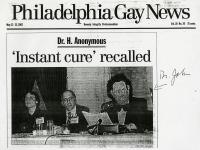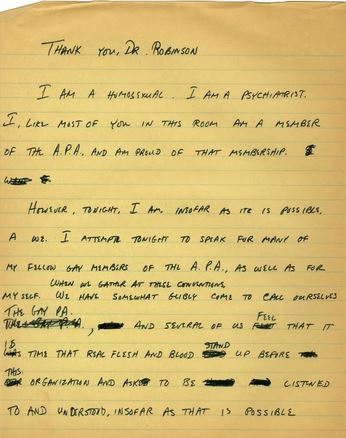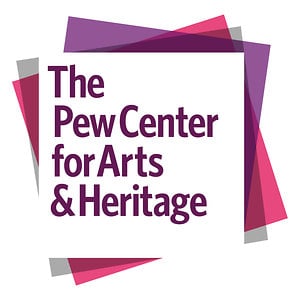On November 18, discover one of the pioneers of the LGBT rights movement, Dr. John Fryer of Philadelphia – i.e. “Dr. Anonymous” – in this program combing performance and discussion.
Playwright Ain Gordon unveils the first excerpt of his upcoming play exploring Fryer's story with a dramatic performance and conversation discussing Gordon's process - creating historical fiction from intensive primary source research - and connecting Fryer's address with the current fight for LGBT rights.
Dr. Steven Sokoll, Clinical Associate Professor, University of Pennsylvania Perelman School of Medicine, will join the discussion moderated by Lisa Nelson-Haynes, Associate Director at the Painted Bride Art Center (where Gordon's play will premier in May 2016).
Read more about the 11/18 program below.
“History cannot be the story of everything that happened, it’s not possible. Some things made it, and some things did not.” -Playwright Ain Gordon, HSP’s Embedded Artist.
The papers of Dr. John Ercel Fryer, a Temple professor and professional psychiatrist, were some of those things that made it. But since the collection was donated to HSP in 2003, it has remained in the vaults, rarely unexplored. Until now.

Image: Dr. John Ercel Fryer, i.e. Dr. Anonymous, addresses the 1972 American Psychiatric Association in disguise, denouncing the medical profession’s view of homosexuality.
Ain Gordon, HSP's Embedded Artist, has been sifting, box by box, folder by folder through the 217 boxes as he develops a new play inspired by his research into Fryer’s life. As he does, a new chapter in LGBT history has opened.
In the years before and after the Stonewall riots, homosexual men and women were considered sick. This was not only the opinion of many Americans, but the official viewpoint of the American Psychiatric Association (APA), which deemed homosexuality a mental illness, “curable” through lobotomy and electro-shock therapy.
Styling himself "Dr. Anonymous," Fryer donned a Richard Nixon mask, an oversized suit, and used a voice modulator to address the APA's 1972 annual meeting, denouncing the dubious "science" underpinning the medical profession's view of homosexuality.
The next year, the APA’s classification of homosexuality as a mental illness was removed from the Diagnostic and Statistical Manual, resulting in "twenty million homosexuals instantly cured," as cheeky Philadelphia newspapers' headlines ran.
Dr. Fryer does not cut an obvious revolutionary figure. Born in rural Kentucky and a dedicated choral director, Fryer risked his career and livelihood by speaking up - as a professor seeking tenure and a professional therapist a full calendar of patients. Indeed, Fryer risked his personal safety. The threat of physical violence lingered over homosexuals in Philadelphia as elsewhere. The police were often no help or, worse, the harassers themselves.
What made this man, a professorial psychiatrist from the mid-west, decide to take a stand when no others would? Does Fryer’s early life offer any clues? How can we tell the story of a man from two hundred boxes of seemingly random papers, an “unintended self portrait”?
Image: Dr. Fryer’s notes for his address at the 1972 APA annual meeting, featured in HSP’s newest document display.
On November 18, Gordon unveils the first part of his upcoming play exploring Fryer's story with a dramatic performance and conversation discussing Gordon's process - creating historical fiction from intensive primary source research - and connecting Fryer's address with the current fight for LGBT rights. Lisa Nelson-Haynes, Associate Director at the Painted Bride Art Center (where Gordon's play will premier in May 2106), will moderate the discussion.
A selection of Fryer's collection will also be unveiled, as part of HSP's newest document display.
When we look back, we cannot know ALL that happened. The historical record is rarely, if ever, complete. When we present history, we fill in the gaps, create the voices that spoke, the characters that lived. Are we creating fiction? Have we made history un-true? Or have we created a more layered truth greater than mere fact? Obie award-winning playwright Ain Gordon and the Historical Society of Pennsylvania will explore the intersections of history and fiction, fact and truth, as part of a new two-year project, An Artist Embedded.



